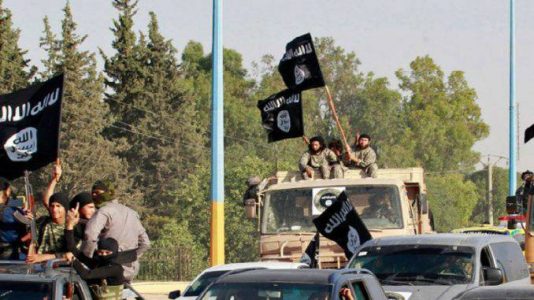
Iraq and Syria can’t afford to allow the Islamic State to return as major challenge
Despite Covid-19, Iraqis have returned to the streets to demand an end to mismanagement, corruption and sectarianism as Mustafa Al Kadhimi was confirmed as the country’s new prime minister. His first act was to mollify protesters by calling for the release of dozens of their number imprisoned since they took to the streets last October, promising compensation to those who were slain by security forces, and pledging to “hold to account all those who shed Iraqi blood.”
He followed up these verbal assurances by ordering security forces to arrest five men from a local party’s office in the southern city of Basra after the shooting death of a protesters outside the building. Since demonstrations began, shooters have generally got away with murder. He will have to continue this crack-down if he is to retain credibility.
Kadhimi also promoted highly-respected and popular General Abdel Wahab Al Saadi, who played a major role in the fight against the Islamic State but was demoted last year by former Prime Minister Adel Abdel Mahdi.
Kadhimi is said to have stamps of approval of regional rivals, Iran and the US. An independent and pragmatist, he lived in exile in Tehran during the rule of Saddam Hussein and wrote articles critical of him. While intelligence chief from 2016 until his appointment as premier, he cultivated good relations with Washington.
While courting the public, Kadhimi has been subjected to a rough ride from competing assembly factions which have squabbled over his nominees for the oil and foreign affairs ministries and rejected his candidates for trade, justice, culture, agriculture and migration. Only 15 of his 22 nominees have been confirmed.
He has to contend with two competing domestic blocs, Binna which is loyal to Iran and Islah which is dominated by the unpredictable Shia cleric Muqtada Al Sadr. Both blocs group Shia, Sunni and Kurdish parties which have multiple agendas and are committed to preserving their patronage networks rather than working for the good of Iraq.
He clearly has to navigate skilfully between blocs and among factions to govern at a time of pandemic, economic and social collapse, and the revival of Daesh and its affiliates in both Iraq and Syria.
Kadhimi faces a host of challenges in addition to the coronavirus. Due to the dramatic fall in the price of oil, Iraq is suffering its worst economic crisis since the 2003 US invasion and occupation. Iraqis encounter increasing deprivation and never-ending electricity outages, as well as shortages of potable water.
Simmering summer is on the way. The country’s healthcare facilities, once the pride of Iraq, have been eroded by sanctions and destroyed by warfare. If Covid-19 breaks out in Iraq, it will be difficult to contain infection and thousands of Iraqis could contract the virus, sicken and die.
As he has the for-now support of the erratic Trump administration as well as Iran, Kadhimi needs to maintain Washington’s backing without upsetting Tehran, which is Iraq’s main trading partner and supplier of 20 per cent of Iraq’s electricity. Despite its campaign of “maximum pressure” – i.e., economic war – on Iran, the administration has granted Baghdad a new 120 day waiver allowing Iraq to continue its purchases from Iran of electricity and fuel for power plants.
By reiterating Baghdad’s refusal to allow its territory to be used for attacks on neighbouring countries, Kadhimi has tried to assuage Iran’s concerns over strikes on Iranian assets by US forces in Iraq. These include the assassination near Baghdad of General Qassem Soleimani, commander of Iran’s Quds force, and strikes on pro-Iranian Iraqi militias.
When negotiating a new status of forces deal between Iraq and the US, Kadhimi will have to steer adroitly between politicians who demand the full withdrawal of US forces from Iraq and those who are prepared to accept the presence of US forces. Kadhimi will also have to deal carefully with the Trump administration which makes policy shifts without rhyme or reason from time to time and day to day, even within a single day.
While threatened by the coronavirus, weakened economically, and tied in knots politically, Iraq also has to renew its fight against Daesh which has regrouped and is stepping up attacks on Iraqi military and civilian targets. The movement’s leadership has launched a “Ramadan offensive” and urged fighters to mount fresh operations in both Iraq and Syria while their governments have deployed the army and security forces to impose lockdown in urban areas and curbed country-wide traffic.
Covid-19 has, therefore, given Daesh fighters increased freedom of movement to operate from inaccessible Iraqi mountain ranges in Dyala and Kirkuk provinces, cross into Syria and make common cause with Daesh survivors based in that country’s eastern desert. In Iraq, Daesh has struck hyper-sensitive targets near the cities of Kirkuk and Baghdad.
Daesh has managed to revive due to Baghdad’s failure to secure control of the north following the defeat of the false “caliphate”, which was established in 2014. The attacks by Daesh remnants have followed the pattern set before then. Islamic State terrorists ambush military convoys and patrols and hit checkpoints.
They finance their activities by kidnapping for ransom and other criminal activities. If Kadhimi is to halt Daesh’s depredations, he will have to redeploy the army and resume the campaign to eradicate this poisonous movement. He will need the help of the Syrian government in this effort. Neither Iraq nor Syria can afford to allow Daesh to return as a major challenge.
Source: Jordan Times





